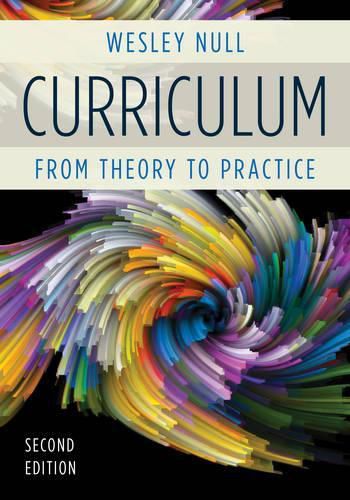Readings Newsletter
Become a Readings Member to make your shopping experience even easier.
Sign in or sign up for free!
You’re not far away from qualifying for FREE standard shipping within Australia
You’ve qualified for FREE standard shipping within Australia
The cart is loading…






This updated second edition of Curriculum: From Theory to Practice provides an introduction to curriculum theory and how it relates to classroom practice. Wesley Null builds upon recent developments while at the same time continuing to provide a unique organization of the curriculum field into five traditions: systematic, existential, radical, pragmatic, and deliberative. Null discusses the philosophical foundations of curriculum as well as historical and contemporary figures who have shaped each curriculum tradition. To ensure breadth and scope, Null has expanded this second edition to include figures not present in the first.
Additionally, after a chapter on each of the five perspectives, Null presents case studies that describe realistic and specific curriculum problems that commonly arise within educational institutions at all levels. Scholars and practitioners alike are given opportunities to practice resolving curriculum problems through deliberation. Each case study focuses on a critical issue such as the implementation of curriculum standards, the attempt to reform core curriculum within universities, and the complex practice of curriculum making. In the final chapter, Null offers a vision for the curriculum field that connects curriculum deliberation with recent developments in moral philosophy.
$9.00 standard shipping within Australia
FREE standard shipping within Australia for orders over $100.00
Express & International shipping calculated at checkout
This updated second edition of Curriculum: From Theory to Practice provides an introduction to curriculum theory and how it relates to classroom practice. Wesley Null builds upon recent developments while at the same time continuing to provide a unique organization of the curriculum field into five traditions: systematic, existential, radical, pragmatic, and deliberative. Null discusses the philosophical foundations of curriculum as well as historical and contemporary figures who have shaped each curriculum tradition. To ensure breadth and scope, Null has expanded this second edition to include figures not present in the first.
Additionally, after a chapter on each of the five perspectives, Null presents case studies that describe realistic and specific curriculum problems that commonly arise within educational institutions at all levels. Scholars and practitioners alike are given opportunities to practice resolving curriculum problems through deliberation. Each case study focuses on a critical issue such as the implementation of curriculum standards, the attempt to reform core curriculum within universities, and the complex practice of curriculum making. In the final chapter, Null offers a vision for the curriculum field that connects curriculum deliberation with recent developments in moral philosophy.